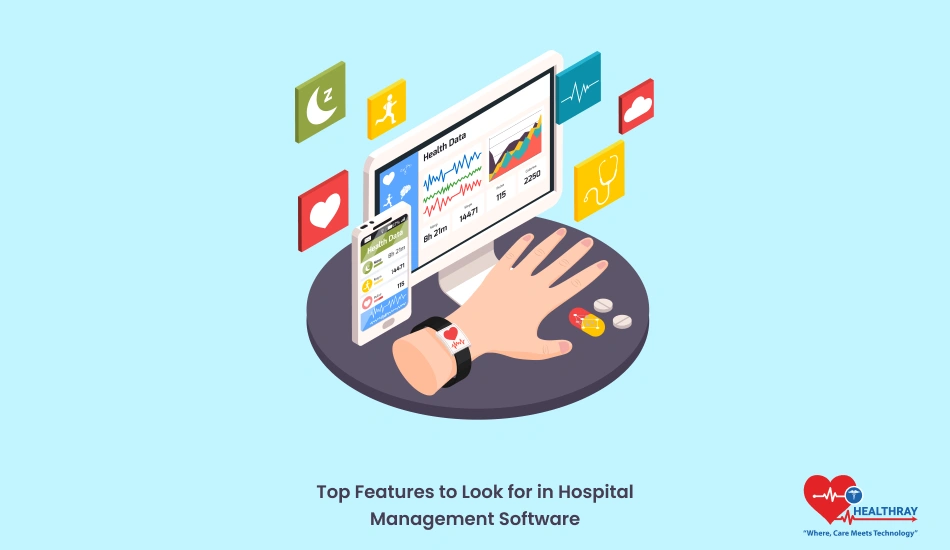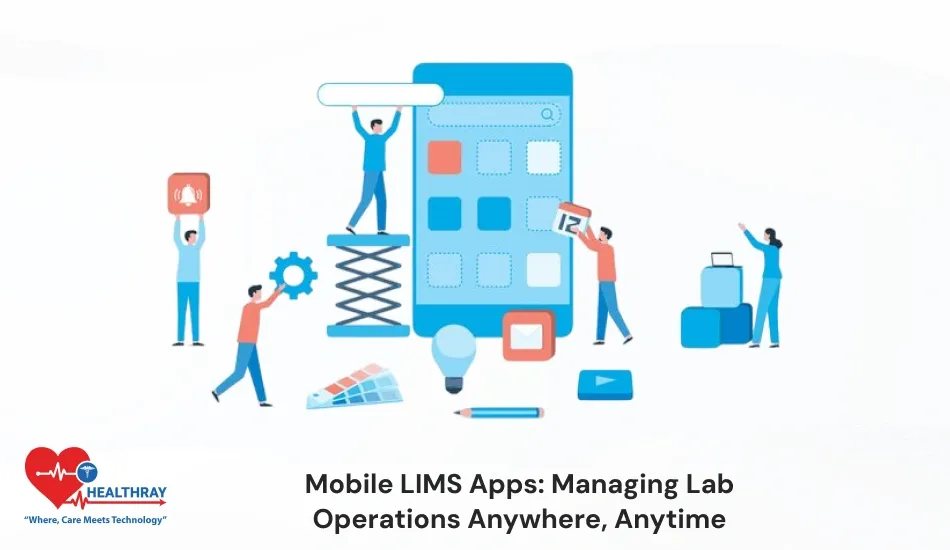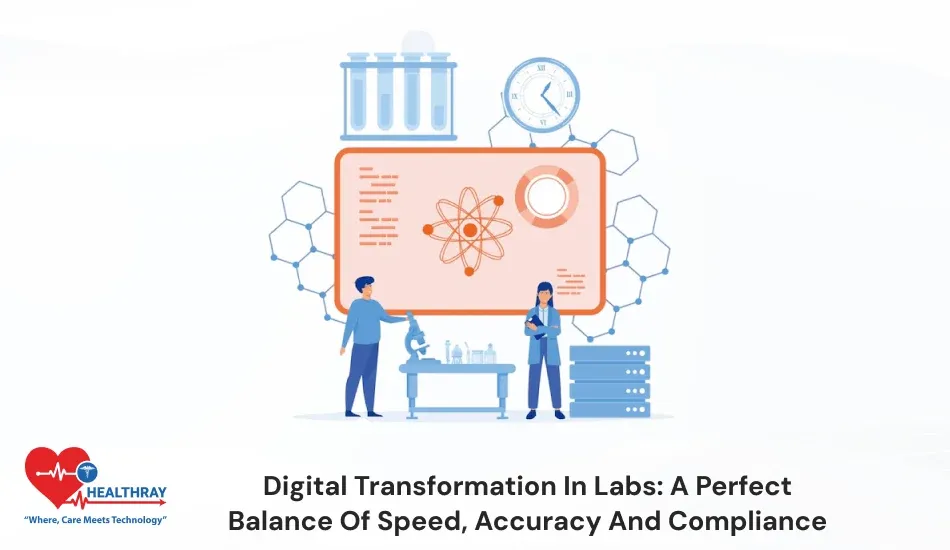Selecting the right hospital management software are crucial to the functions of effectively optimizing workflow, whilst improving the quality of care delivered to patients, and maintaining regulation. In the case of hospital owners, COOs or CTOs, the proper software can guarantee both streamlined work processes and financial optimization. Below, we discuss the key characteristics to consider in hospital management software.
Patient Management and Scheduling
Effective administration of patient data is the engine of any hospital management software. Computer applications would also be optimized for ease of patients registration, timetable and appointment planning with a view to leverage the hospital infrastructure.
- Real-time Scheduling: The system shall be able to update appointments and patient information in real-time and minimize conflicts and omissions.
- Multi-department Access: Patient information is open access and available to different departments and, as a consequence, staff are able to extensively collaborate among themselves and ensure seamless continuity of care.
- Telemedicine Integration: With the demand for virtual care growing, the software is prepared to meet a telemedicine need such that remote consultations can be conducted without moving all the information to a different platform.
Effective patient scheduling reduces patient waiting time, increases staffing efficiency and guarantees that patients receive all the care they are entitled to without getting backlog.
Electronic Medical Records (EMR) and EHR Management
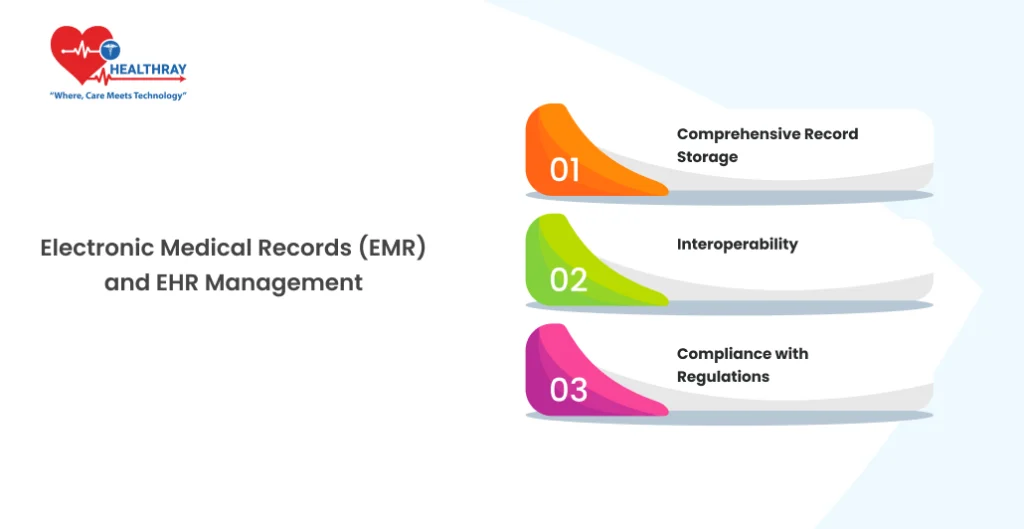
A good EMR/EHR management system is of high importance for hospitals who want to provide high quality patient care. The system has to maintain the whole medical information of a patient and be available to other departments.
- Comprehensive Record Storage: The hospital software should store everything from patient history, diagnoses, treatments, and prescriptions, allowing doctors to make informed decisions quickly.
- Interoperability: That the system should be capable of interfacing with other systems within the hospital, such as laboratory and radiology, to ensure interoperability and unimpeded data transfer.
- Compliance with Regulations: The algorithm is designed to ensure that patient data is protected under privacy laws such as HIPAA or GDPR, so that unlawful access to the information is not possible.
The number of errors is also reduced and the time to care is growing when all the patient data is in one place. Seamless data exchange across departments ensures that no information is lost between handoffs.
Billing and Revenue Cycle Management
Hospital finance management is a complicated process and an efficient hospital management system is one that is streamlined by automating billing, processing of claims, and revenue cycle.
- Automated Billing: Automating from patient registration through to insurance claims reduction of errors and acceleration of payment cycle.
- Claims Management: Software should manage the entire claims cycle (from validation to filing), and ensure continuous communication to the health insurers.
- Revenue Cycle Insights: The system would be expected to provide in real time on the revenue of the hospital, thereby allowing management to make wiser, more astute decisions to improve the financial integrity.
Automating the billing process reduces human errors and administrative delays, ensuring faster payments and smoother financial management. The hospital software helps maintain a steady cash flow and reduces bottlenecks in payment collection.
Inventory and Supply Chain Management
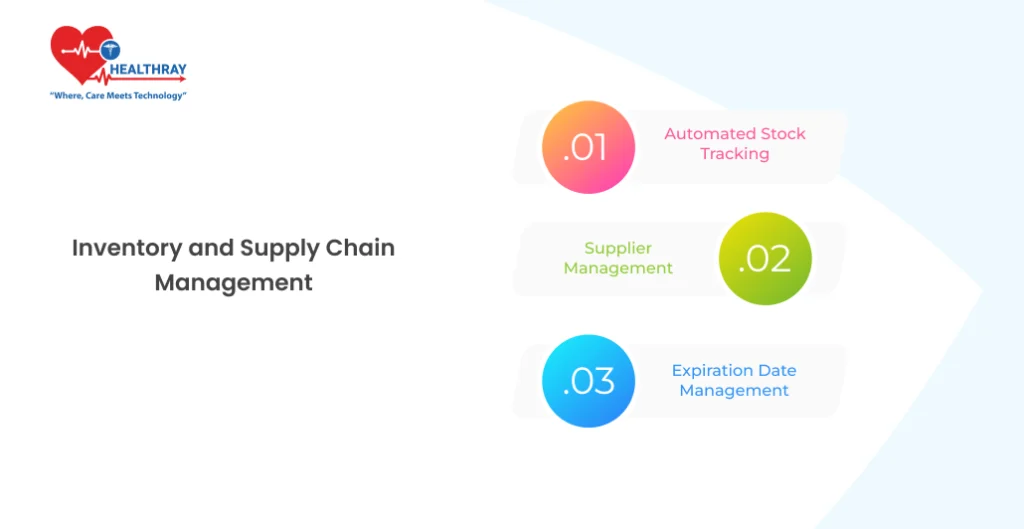
Health care providers rely on a constant supply of equipment and pharmaceuticals to function properly. Optimal inventory and supply chain management ensures there are no interruptions in the delivery of care.
- Automated Stock Tracking: The hospital software should track stock levels of medical supplies, alert staff when inventory is low, and automate reordering processes.
- Supplier Management: The software is also to keep information on the vendors, record of the purchase requests, and to evaluate the vendor performance based on KPIs like the time of delivery and the product quality.
- Expiration Date Management: The hospital software should alert hospital staff when medical supplies and medications are nearing expiration, ensuring that expired items are not used.
Successful inventory management prevents out of stock, waste, and it makes the hospital invariably prepared to deliver the needs of the patients.
Reporting and Analytics
Data-driven decision-making is essential for improving hospital operations. Identify software that adequately has reporting analytics functionality.
- Customizable Reports: The hospital software should allow hospitals to generate reports on various key performance indicators (KPIs), such as patient flow, revenue, and resource utilization.
- Advanced Analytics: Features, such as trend and predictive analytics, can enable hospitals to anticipate inefficiencies, forecast patient admission rates, and handle planning of resources, etc.
- Real-time Insights: Real-time data access enables HCO administrators to respond promptly to operational problems and to emerging trends.
Standardized reporting and analytics provide hospital administration with a view into performance patterns, identify areas of inefficiency, and enable them to make decisions that are data-driven and lead to improved operations.
Security and Compliance
Hospitals handle sensitive patient information, and security is non-negotiable. Its hospital management program should comply with all privacy laws and still protect data.
- Data Encryption: Find systems which encrypt sensitive patient information in both rest and transit to avoid being exploited by unauthorized access.
- Role-based Access Control: The hospital software should allow for role-based access, ensuring that only authorized personnel can view or edit sensitive information.
- Compliance: The system is required to meet industry standards such as HIPAA and GDPR so that legal and patient data can be protected.
Protecting patient information not only ensures compliance but also builds trust with patients, knowing their data is secure.
Customization and Scalability
To work, HMS Software that is flexible enough to absorb their own specific workflow, and flexible enough to grow with them. Customization and scalability are important factors on how to select a hospital management system.
- Tailored Workflows: The hospital software should allow for customized workflows that reflect the specific needs of the hospital, ensuring smooth operations.
- Scalability: With the expansion or growth of your hospital, the software software that best meets the needs of a growing or expanding hospital needs must be able to easily assimilate new departments, personnel, or even new hospital sites.
An extensible, modular system assures that the software adapts to the hospital’s needs as it evolves, avoiding the cost of costly upgrades or replacements.
Mobile App Integration
In a busy hospital-setting environment, anytime access to a patient’s information is a real life changer. Mobile application integration enables doctors and nurses to find information in the hospital at any place they like.
- Mobile Access to Patient Data: Staff should be allowed to access patient notes, diaries and reports from portable devices so that they can be kept up to date even when they are moving from department to department.
- Push Notifications: The hospital software should provide notifications for critical updates like lab results or new patient admissions, helping staff stay on top of important events.
Hospital-in-the-hand mobile access access hospital systems enables clinicians to process the information needed to make decisions more rapidly and thus to enhance care, particularly in emergency decisions.
Artificial Intelligence and Machine Learning
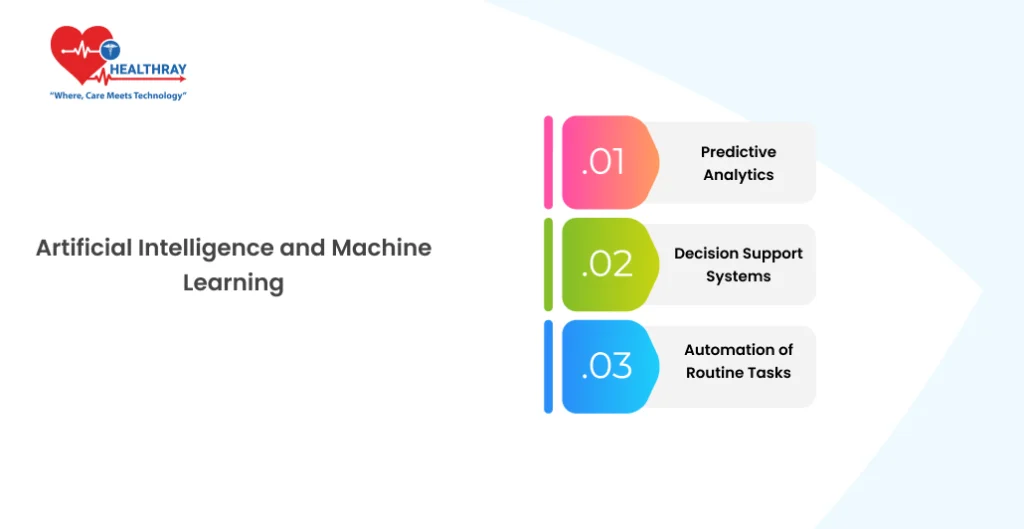
Thanks to artificial intelligence (AI) and machine learning (ML), the management of the hospital is changing in a fast manner, by offering insights and automating decision processes.
- Predictive Analytics: AI is able to predict patient admissions from hospitals, enabling hospitals to use their resources more optimally.
- Decision Support Systems: Machine learning algorithms can assess clinical data, and make recommendations for diagnoses or therapy, thus enhancing diagnostic accuracy and speed of medical decision-making.
- Automation of Routine Tasks: AI can automate the tasks of, for example, appointment reminders, reordering of commodities, or processing of claims, thus allowing staff to devote their time to providing patient care.
Artificial intelligence (AI) and machine learning have great potential for making hospitals more efficient (including automating certain clinical services) as well as for improving patient outcomes through decreased human error and actionable patient/case insights from data.
User Training and Support
Not even the most advanced hospital information management (HIM) software remains helpful unless it is mastered by the users. Proper user training and ongoing support are crucial for ensuring smooth adoption.
- Comprehensive Training: Equipment suppliers should give comprehensive training to hospital staff, either in-house or as a webinar, so that all Hospital staff are properly equipped to use the equipment. PowerPoint AI or similar AI tools to create PowerPoint slides can be used to create clear, structured training presentations that help hospital staff quickly understand and correctly operate the equipment.
- Ongoing Support: Look for hospital software providers that offer ongoing technical support and regular updates to keep the system running smoothly and in compliance with any regulatory changes.
- User-friendly Interface: The system should have a simple and intuitive interface to minimize the learning curve and ensure that staff can navigate it easily.
Adequate training and support guarantee that the hospital is able to deploy the software in a productive way, to its full potential and to provide a fluid workflow.
Conclusion
Selecting the appropriate hospital management software is key to best practices in hospital operations, regulatory adherence, and delivery of excellent patient care. In patient management through to AI-driven decision support, the right set of features can change the way a hospital operates. For software selection, please confirm it fits the needs of your hospital, and can accommodate future expansion of your organisation.
